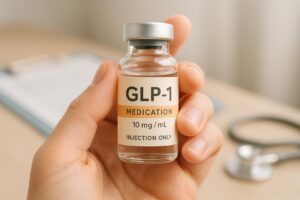Do GLP-1 Medications Cause Hair Loss?

At some point, many of us have encountered a situation where a seemingly beneficial treatment comes with unexpected side effects. This is particularly true for medications aimed at weight loss and diabetes management, such as GLP-1 receptor agonists. As these medications grow in popularity, so too do the discussions surrounding their potential side effects, including an issue that has garnered considerable attention: hair loss.
Did you know that rapid weight loss can lead to temporary hair shedding? Research suggests that the physiological changes brought about by significant weight loss can disrupt the normal hair growth cycle, leading to conditions like telogen effluvium. For many individuals considering GLP-1 medications, the question arises: do GLP-1 medications like Ozempic or Wegovy contribute to hair loss?
In this blog post, we aim to explore the intricate relationship between GLP-1 medications and hair loss, examining the potential mechanisms behind this side effect, what research says, and how to manage it effectively. By the end of this article, we hope to provide you with a comprehensive understanding of the topic, enabling you to make informed decisions about your health and wellness journey.
Understanding GLP-1 Medications
What are GLP-1 Medications?
GLP-1, or glucagon-like peptide-1, is a hormone that plays a significant role in glucose metabolism and appetite regulation. Medications that mimic this hormone, known as GLP-1 receptor agonists, are widely used to manage blood sugar levels in individuals with type 2 diabetes and to assist with weight loss. Some of the most popular GLP-1 medications include:
- Ozempic® (semaglutide)
- Wegovy® (semaglutide)
- Mounjaro® (tirzepatide)
- Zepbound® (tirzepatide)
These medications work by enhancing glucose-dependent insulin secretion, suppressing glucagon secretion, and slowing gastric emptying. They have shown significant efficacy in promoting weight loss, which has made them increasingly popular.
The Rise of GLP-1 Medications
As the obesity epidemic continues to rise, driven by various factors including lifestyle changes and genetic predispositions, the demand for effective weight loss solutions has surged. Statistics show that nearly 40% of adults in the United States are classified as obese. The advent of GLP-1 medications has provided a new avenue for individuals struggling with weight management, offering hope for sustainable weight loss and improved metabolic health.
The Connection Between GLP-1 Medications and Hair Loss
Can GLP-1 Medications Cause Hair Loss?
While hair loss is not typically listed as a common side effect of GLP-1 medications, anecdotal reports and emerging studies suggest a possible connection, particularly during periods of rapid weight loss. It’s essential to understand that while these medications may be associated with hair loss, it is often not a direct effect of the medication itself.
Mechanisms Behind Hair Loss
-
Rapid Weight Loss: The most significant factor linking GLP-1 medications to hair loss appears to be the rapid weight loss they can induce. When the body experiences a sudden drop in weight, it can trigger a stress response that alters the hair growth cycle, leading to a condition known as telogen effluvium. This condition is characterized by excessive shedding of hair and is often temporary.
-
Nutritional Deficiencies: Another contributing factor may be related to dietary changes that occur when using GLP-1 medications. As these medications suppress appetite, some individuals may not consume adequate nutrients necessary for hair health, leading to deficiencies in essential vitamins and minerals such as biotin, zinc, and iron. This can further exacerbate hair thinning and loss.
-
Hormonal Changes: Weight loss can also lead to hormonal shifts in the body. Since GLP-1 medications mimic the action of hormones involved in glucose metabolism, they may indirectly influence hormonal levels related to hair growth. Changes in insulin and estrogen levels, for example, can impact the hair growth cycle.
Research Insights
Recent studies have begun to investigate the relationship between GLP-1 medications and hair loss. One significant study found that patients using semaglutide had a higher risk of hair loss compared to those on older weight-loss medications. Notably, this risk appeared to be greater in women.
Experts suggest that while hair loss can occur during weight loss treatment, it is often temporary and tends to resolve once weight stabilizes and nutritional intake improves. For many patients, hair regrowth can be expected within three to six months after achieving weight stabilization.
Managing Hair Loss During Weight Loss
Consultation with Healthcare Providers
If you’re considering or currently using GLP-1 medications and are concerned about hair loss, it’s crucial to engage with your healthcare provider. They can help assess your situation, provide guidance on managing side effects, and recommend appropriate dietary adjustments or supplements to support hair health.
Nutritional Support
To mitigate the risk of hair loss during weight loss, focus on maintaining a balanced diet rich in essential nutrients. Here are some key dietary considerations:
- Increase Protein Intake: Adequate protein is vital for hair growth. Include sources such as lean meats, fish, eggs, legumes, and nuts in your diet.
- Incorporate Essential Vitamins and Minerals: Nutrients such as biotin, zinc, and iron are crucial for hair health. Consider discussing supplementation with your healthcare provider if you’re unable to meet your nutritional needs through food alone.
- Stay Hydrated: Proper hydration supports overall bodily functions, including hair health.
Stress Management
Since stress can also trigger hair loss, incorporating stress-reducing practices such as mindfulness, meditation, or yoga can be beneficial. Maintaining a healthy lifestyle that includes regular physical activity and sufficient sleep can also enhance your overall well-being.
Conclusion
The relationship between GLP-1 medications and hair loss is complex and multifaceted. While these medications can lead to rapid weight loss—a primary factor associated with hair shedding—they do not directly cause hair loss in most individuals. Instead, it is often the physiological changes and nutritional deficiencies that accompany significant weight loss that contribute to this side effect.
At TrimRx, we are committed to providing personalized, medically supervised weight loss solutions that prioritize your health and well-being. If you’re considering GLP-1 medications, we encourage you to complete our free assessment quiz to determine your eligibility for our personalized weight loss programs. Together, we’ll explore the best strategies to help you achieve your health goals while minimizing potential side effects.
FAQ
Is hair loss common among users of GLP-1 medications?
While hair loss has been reported, it is generally not common and tends to be temporary, often related to rapid weight loss rather than a direct effect of the medication.
How can I prevent hair loss while taking GLP-1 medications?
Focus on a balanced diet rich in protein and essential vitamins and minerals. Regular consultations with your healthcare provider for personalized guidance on managing side effects are also recommended.
Will my hair grow back after stopping GLP-1 medications?
In most cases, hair regrowth occurs within three to six months after weight stabilization and improved nutritional intake.
Should I be concerned about other side effects from GLP-1 medications?
As with any medication, it’s essential to discuss potential side effects with your healthcare provider. They can provide guidance and monitor your health as you use these medications.
Can I take supplements to support hair health while on GLP-1 medications?
Yes, consider discussing supplementation with your healthcare provider to address any potential nutritional deficiencies that may contribute to hair loss.
By understanding the nuances of GLP-1 medications and their potential effects on hair health, we can navigate the weight loss journey together, ensuring that you achieve your goals while maintaining your overall well-being.

Transforming Lives, One Step at a Time
Keep reading
GLP-1 Medication Side Effect Checker
Worried about GLP-1 medication side effects? Use our free checker for Semaglutide, Liraglutide, and more to learn what to expect and stay informed!
GLP-1 Dose Titration: Research Insights
Gradual GLP-1 dose increases balance weight loss and GI side effects; personalized titration and monitoring improve real-world outcomes.
Wave Life Sciences unveils Phase I results for obesity treatment
Wave Life Sciences’ single-dose RNA therapy showed 4% total body fat reduction and promising Phase I results.



